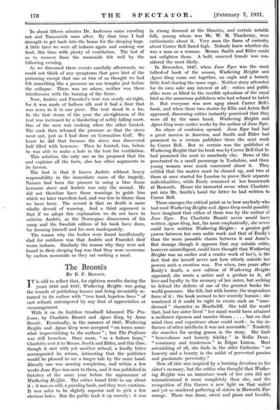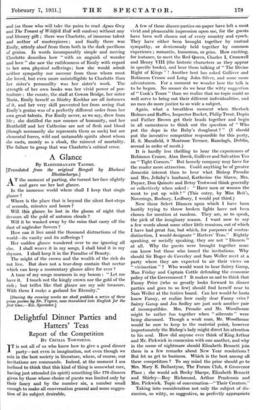The BrontEs BY E. F. BENSON.
IT is odd to reflect that, for eighteen months during the years 1846 and 1847, Wuthering Heights was going the rounds of publishing houses and being invariably re- turned to its author with "two hard, hopeless lines " of curt refusal, untempered by any hint of appreciation or encouragement.
With it on its fruitless treadmill laboured The Pro- fessor, by Charlotte Brontë and Agnes Grey, by Anne Brontë. Eventually, in the summer of 1847, Wuthering Heights and Agnes Grey were accepted " on terms some- what impoverishing to the authors " ; but The Professor was still homeless. Once more, " as a forlorn hope," Charlotte sent it to Messrs. Smith and Elder, and this time, though. it met with yet another refusal, a kindly letter accompanied its return, intimating that the publisher would be pleased to see a longer tale by the same hand. Already one was nearing completion, and within a few weeks Jane Eyre was sent to them, and it was published in October of the same year before the appearance of Wuthering Height:. The critics found little to say about it it was an odd, a puzzling book, and they were cautious. It was safer to be slightly superior and to pi& a few obvious holes. But the public took it up warmly; it was in strong demand at the libraries, and certain notable folk, among whom was Mr. W. M. Thackeray, were enthusiastic about it. Very soon the flame of curiosity about Currer Bell flared high. Nobody knew whether she was a man or a woman. Messrs. Smith and Elder could not enlighten them. A bold, unsexed female was con- sidered the most likely.
In December, 1847, when Jane Eyre was the most talked-of book of the season, Wuthering Heights and Agnes Grey came out together, an eagle and a homely little fowl sharing the same cage. Neither story attracted for its own sake any interest at all : critics and public alike were as blind to the terrible splendour of the royal bird as the numerous publishers who had refused to hatch it. But everyone was now agog about Currer Bell's book, and when these two stories by Ellis and Acton Bell appeared, discerning critics instantly perceived that they were all by the same hand. Wuthering Heights and Agnes Grey were earlier works by the author of Jane Eyre.
An abyss of confusion opened. Jane Eyre had had a great success in America, and Smith and Elder had promised to a certain publisher there the next work by Currer Bell. But so certain was the publisher of Wuthering Heights that his book was by Currer Bell that he had promised the next to somebody else. News of this penetrated to a small parsonage in Yorkshire, and three young women were much concerned about it. They settled that the matter must be cleared up, and two of them at once started for London to prove their separate individualities, while Emily remained at her housework at Haworth. Hence the immortal scene when Charlotte put into Mr. Smith's hand the letter he had written to Currer Bell.
There emerges the critical point as to how anybody who had read Wuthering Heights and Agnes Grey could possibly have imagined that' either of them was by the author of Jane Eyre. For Charlotte Brontë never would have written Agnes Grey, but, far more emphatically, she never could have written Wuthering Heights : a greater gulf yawns between her own noble work and that of Emily's than the more passable chasm between it and Anne's. But strange though it appears that any outside critic, however unintelligent, could have thought that Wuthering Heights was an earlier and a cruder work of her's, is the fact that she herself never saw how utterly outside her powers such a creation was. For when, two years after Emily's death, a new edition of Wuthering Heights appeared, she wrote a notice and a preface to it, all love and loyalty to the memory of her sister, but seeking to defend the defects of one of the greatest books the world possesses. She felt, but with horror, the stupendous force of it : the book seemed to her scarcely human : she wondered if it could be right to create such an "unre- deemed " character as Heathcliff. She told the world that, had her sister lived " her mind would have attained a mellower ripeness and sunnier bloom . . . . but on that mind time and experience alone could work : to the in- fluence of other intellects it was not amenable." Tenderly she searches for saving graces in the story. She finds " benevolence and homely fidelity " in Nellie Dean ; " constancy and tenderness " in Edgar Linton. Most astonishing of all, she finds in the elder Catherine " an honesty and a beauty in the midst of perverted passion and passionate perversity."
Now all this was inspired. by a burning devotion to her sister's memory, but the critics who thought that Wuther- ing Heights was an immature work of her own did npt misunderstand it more completely than she, and the recognition of this throws a new light on that united and yet so sundered gathering of sisters in Haworth Par- sonage. There was Anne, sweet and pious and lovable, and (as those who will take the pains to read Agnes Grey and The Tenant of Wildfell Hall will confess) without any real literary gift ; there was Charlotte, of immense talent and author of masterpieces ; and finally there was Emily, utterly aloof from them both in the dark pavilions of genius. In words incomparably simple and moving Charlotte describes how " with an anguish of wonder and love " she saw the ruthlessness of Emily with regard to her own physical sufferings ; how she would admit neither sympathy nor succour from those whom most she loved, but even more unintelligible to Charlotte than her sister's personality was her sister's work. The strength of her own. books was her vivid power of por- traiture : the curate, the staff at Cowan Bridge, her sister Maria, Emily herself as Shirley Keeldar are all instances of it, and het very skill prevented her from seeing that Emily's genius was of a perfectly different order from her own great talents. For Emily never, as we say, drew from life ; she distilled, the raw essence of humanity, and her Heatheliff and het Catherine are not of flesh and blood (though necessarily she represents them as such) but are elemental forces, wild and untamable spirits about whom she casts, merely as a "cloak, the raiment of mortality. The failure to grasp that was Charlotte's critical error.











































 Previous page
Previous page